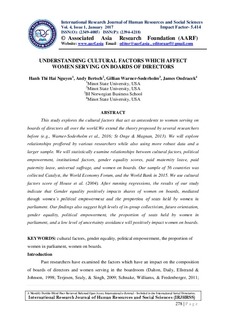Understanding Cultural Factors which Affect Women Serving on Boards of Directors
Journal article, Peer reviewed
Published version
Permanent lenke
http://hdl.handle.net/11250/2481021Utgivelsesdato
2017Metadata
Vis full innførselSamlinger
- Publikasjoner fra CRIStin - BI [1015]
- Scientific articles [2181]
Originalversjon
International Research Journal of Human Resources and Social Sciences. 2017, 4 (1), 278-305.Sammendrag
This study explores the cultural factors that act as antecedents to women serving on boards of directors all over the world.We extend the theory proposed by several researchers before (e.g., Warner-Soderholm et al., 2016; St Onge & Magnan, 2013). We will explore relationships proffered by various researchers while also using more robust data and a larger sample. We will statistically examine relationships between cultural factors, political empowerment, institutional factors, gender equality scores, paid maternity leave, paid paternity leave, universal suffrage, and women on boards. Our sample of 56 countries was collected Catalyst, the World Economy Forum, and the World Bank in 2015. We use cultural factors score of House et al. (2004). After running regressions, the results of our study indicate that Gender equality positively impacts shares of women on boards, mediated though women’s political empowerment and the proportion of seats held by women in parliament. Our findings also suggest high levels of in-group collectivism, future orientation, gender equality, political empowerment, the proportion of seats held by women in parliament, and a low level of uncertainty avoidance will positively impact women on boards.
Beskrivelse
This is and Open Access journal available from http://www.aarf.asia/irjhrss.php
